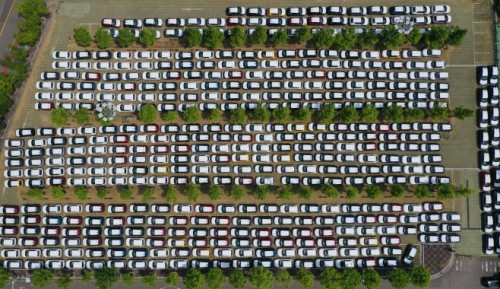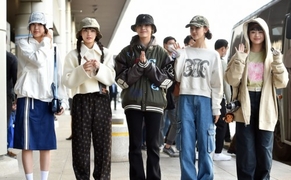 |
| Cars for export are temporarily parked in Gwangmyeong, Gyeonggi Province, on June 12, 2022./ Source: Yonhap |
AsiaToday reporter Park Ah-ram
Unionized cargo truck drivers under the Korean Confederation of Trade Unions (KCTU) extended their strike to a sixth day of a general strike on Sunday, deepening woes of the government that struggles to find any other solution to the situation.
Negotiations over controversial issues with the Cargo Truckers Solidarity union failed to make progress over their demands for higher pay, causing disruptions in steel, chemicals and automobile industries nationwide. However, the government is in dilemma over whether or by how long the Safe Trucking Freight Rates System should be extended.
The government said Sunday that the Ministry of Land, Infrastructure and Transport and KCTU officials held their third round of talks from 11 a.m. to 9:30 p.m. on Saturday, but the two sides failed to narrow their differences.
The union demands that the sunset provision of the Safe Trucking Freight Rates System be abolished and the system be expanded to cover all truck types and all kinds of cargo items. The truckers argue that it is necessary to maintain the system, where oil prices are automatically tied to freight rates amid soaring fuel prices.
The interim system, adopted in 2020 as part of a revision to related laws, levies a fine on cargo owners if they pay rates lower than an appropriate level for safe shipping. As a three-year sunset provision, it is set to expire in Dec. 31 this year. It is bound to disappear from next year unless it is renewed.
It was first reviewed by the government in 2008, but was delayed for a decade due to opposition from the shipping and transportation industry. The system was introduced under former President Moon Jae-in as it was one of his pledges during presidential campaign.
In 2018, then-ruling Democratic Party led the revision of the Trucking Transport Business Act. Under the revision, the Safe Trucking Freight Rates System was temporarily operated from 2020 to 2022, in consideration of opposition from shippers and transportation companies.
However, the government’s dilemma is that there is no immediate solution. It is unlikely that the cargo truckers, who experienced the benefits of the system introduced by the former administration in the form of a sunset system, will easily back down, and it is difficult for the transportation industry to accept their demands amid increasing logistics costs.
The general strike also escalated political tensions, leading to a battle for responsibility. “The review for sunset system extension was supposed to be reported to the National Assembly by the beginning of this year. However, the Democratic Party, which was the ruling party at the beginning of the year, was doing nothing until the government change, and now they are raising their voices to legislate the system,” Kwon Seong-dong, floor leader of the ruling People Power Party, said.
While the government and the National Assembly are unable to come up with a solution to the strike, industrial damage is growing like a snowball. Some 27 percent, or 5,850 members, of the 22,000-member Cargo Truckers Solidarity participated in the rallies in 14 regions across the country.
The container installation rate by port was 71.5 percent, which is higher than usual with 65.8 percent. Some ports such as Busan Port and Ulsan Port, have seen their amount of imports and exports decrease due to local traffic disruptions.
#basic freight rate system
Copyright by Asiatoday
Most Read
-
1
-
2
-
3
-
4
-
5
-
6
-
7





















